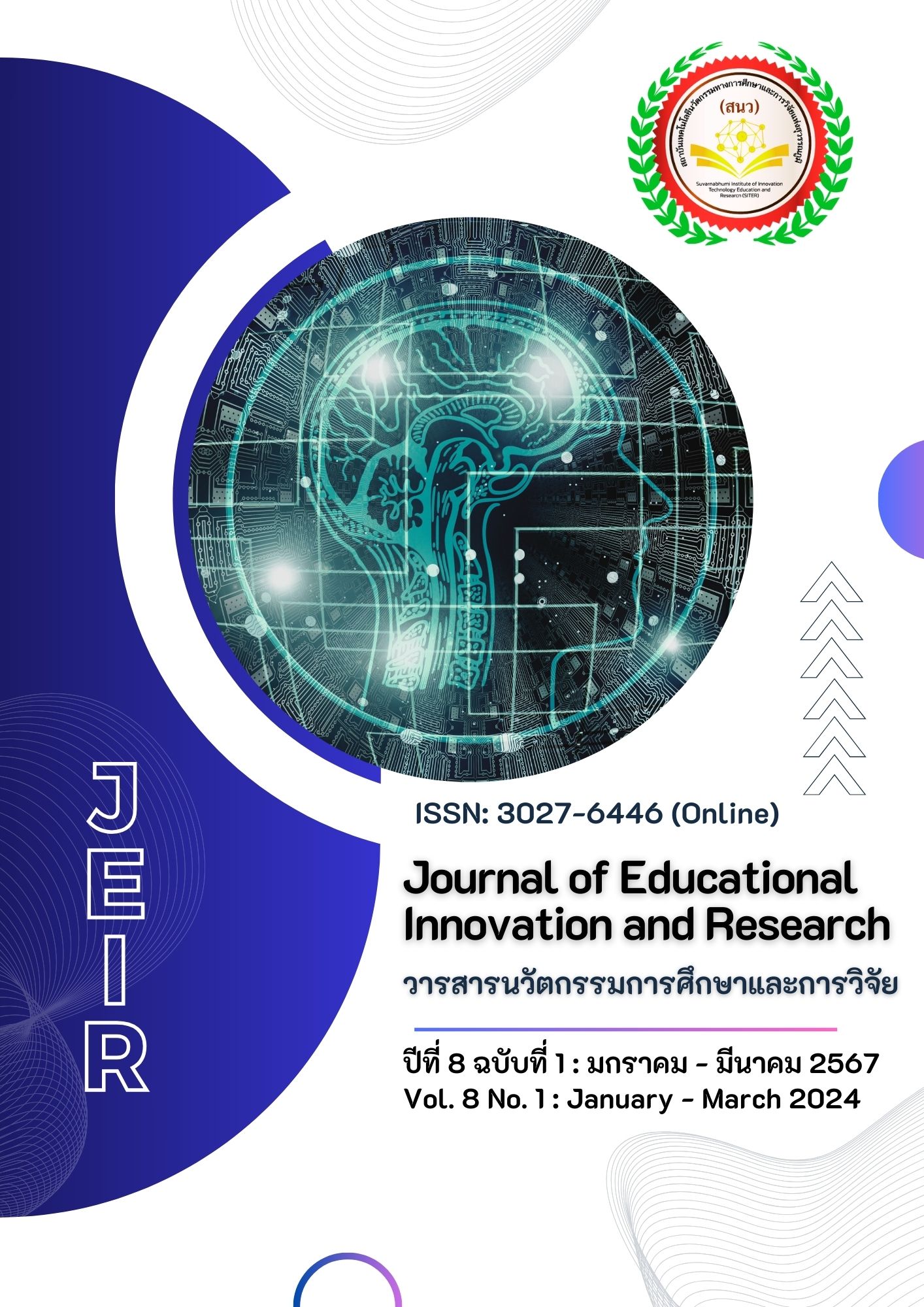รูปแบบการเสริมสร้างวินัยผู้เรียนด้วยวิถีทางทหารในสถานศึกษาระดับอาชีวศึกษา พื้นที่กรุงเทพมหานคร
Main Article Content
บทคัดย่อ
บทความนี้มีวัตถุประสงค์เพื่อ 1) ศึกษาสภาพปัญหาวินัยผู้เรียน 2) ศึกษาความสัมพันธ์ระหว่างตัวแปรคุณลักษณะของผู้นำทางทหาร การจูงใจ คุณธรรมจริยธรรม การบริหารการอาชีวศึกษา พฤติกรรมกลุ่มเพื่อน และการปฏิบัติของครูกับวินัยผู้เรียนด้วยวิถีทางทหาร และ 3) วิเคราะห์และกำหนดรูปแบบการเสริมสร้างวินัยผู้เรียนด้วยวิถีทางทหารในสถานศึกษาระดับอาชีวศึกษา เป็นการวิจัยแบบผสานวิธี พื้นที่วิจัย คือ กรุงเทพมหานคร กลุ่มตัวอย่าง คือ บุคคลากรที่ปฏิบัติงานในสถานศึกษาด้านอาชีวศึกษา จำนวน 350 คน ใช้วิธีคัดเลือกโดยใช้หลักความน่าจะเป็น และใช้วิธีการสุ่มอย่างง่าย ผู้ให้ข้อมูลสำคัญ คือ บุคลากรทางการศึกษาที่ปฏิบัติงานในสถานศึกษาด้านอาชีวศึกษา จากภาครัฐ 9 คน และภาคเอกชน 9 คน รวมทั้งสิ้น 18 คน ใช้วิธีคัดเลือกแบบเจาะจง เครื่องมือที่ใช้ในการวิจัย คือ แบบสอบถาม กับ แบบสัมภาษณ์เชิงลึก วิเคราะห์ข้อมูลเชิงปริมาณโดยใช้ ค่าเฉลี่ย ค่าเบี่ยงเบนมาตรฐาน การถดถอยพหุคูณ ส่วนการวิจัยเชิงคุณภาพ ใช้วิเคราะห์เนื้อหาแล้วเขียนบรรยายเชิงพรรณนา ผลการวิจัยพบว่า
1. สภาพปัญหาวินัย ได้แก่ การตรงต่อเวลา การแต่งกาย ความรับผิดชอบในหน้าที่ การทะเลาะวิวาท ยาเสพติด ไม่ปฏิบัติตามกฎ พฤติกรรมไม่เหมาะสม
2. คุณธรรมจริยธรรม การจูงใจ คุณลักษณะของผู้นำทางทหาร มีความสัมพันธ์เชิงเหตุ-ผลกับการเสริมสร้างวินัยผู้เรียนด้วยวิถีทางทหาร อย่างมีนัยสำคัญทางสถิติที่ระดับ 0.001, 0.01 และ 0.05
3. รูปแบบการเสริมสร้างวินัยผู้เรียนด้วยวิถีทางทหาร ประกอบไปด้วยปัจจัยสำคัญ 3 ประการ ได้แก่ คุณลักษณะของผู้นำทางทหาร การจูงใจ และคุณธรรมจริยธรรม
ข้อค้นพบจากงานวิจัยนี้ สามารถนำไปประยุกต์ในการเสริมสร้างวินัยของผู้เรียนด้านอาชีวศึกษา ด้วยปัจจัย 3 ประการ ได้แก่ คุณลักษณะของผู้นำทางทหาร การจูงใจ และคุณธรรมจริยธรรม ได้ตรงตามเป้าหมาย
Article Details

อนุญาตภายใต้เงื่อนไข Creative Commons Attribution-NonCommercial-NoDerivatives 4.0 International License.
เอกสารอ้างอิง
Department of Military Education. (2017). Handbook of commissioned officers. Bangkok: Arun Printing.
Deutscher Industrie und Handelstag. (2001). Duale Berufsausbildung: Dual Vocational Training. Berlin: DIHT.
Herzberg, F. (1959). Federick; Mausner, Bernard; and Synderman, Block the Motivation to Work. New York: John Willey.
Kohlberg, L. (1964). Development of Moral Character and Moral Ideology. In M.L. Hoffman & L.W. Hoffman (Eds), Review of Child Development Research. Hartord, C.T.: Connecticut Printer.
Kwanpracha, P. (2016). The development of an activity model for enhancing morality in discipline for elementary school students. Journal of Nakhon Phanom University, 6(2), 52-60.
Lieutenant, F., Sanitsom, P. and Intratat, M. (2016). Characteristics of military leaders of graduates from King Kriyathirat Royal Thai Air Force Academy A case study of the academic year 2014. Journal of Humanities and Social Sciences Air Master, 4(4), 153-164.
Mitchell et al. (2017). Enhancing effective classroom management in schools: structures for changing teacher behaviors. Teacher education and special education 2017, SAGE, 40(2), 140-153.
Muenrak, W. and Chairueang, N. (2014). Morals and ethics of Phrom Khiri Vocational College students under vocational education Nakhon Si Thammarat Province. Graduate School Pitchayathat Journal, 9(2), 53-61.
Mwaniki, G. S. (2018). Students' indiscipline: A reflection on the causes of misbehaviour among learners in Kenyan secondary schools. Global Journal of Advanced Research, 5(4), 171-177.
Naewna. (2021). The commander-in-chief of the police ordered police across the country. students hitting Fighting. Retrieved January, 28, 2022, from https://www.naewna.com/local/622025
Newcomb, T. (1962). Student peer group influence. In T. Newcomb & E. Wilson (Eds.), The American college: A psychological and social interpretation of higher learning. New York: Wiley.
Office of the Secretariat of the Council of Education. (2018). Executive Summary Strengthening Discipline in Educational Institutions at the Basic Education Level. Bangkok: Prikwan Graphic Co., Ltd.
Office of the Secretariat of the Council of Education. (2018). Forms and mechanisms for enhancing discipline in basic education institutions of the Federal Republic of Germany. Bangkok: Prikwan Graphic Co., Ltd.
Office of the Vocational Education Commission. (2022). Report on the number of personnel of the Office of the Vocational Education Commission. Bangkok: Office of the Vocational Education Commission.
Porncharoen, R. (2013). Guidelines for Student Discipline Development According to Opinions of Academic Personnel at Rajamangala University of Technology Phra Nakhon {Research report, Rajamangala University of Technology Phra Nakhon, Faculty of Industrial Education].
Raksongmeun, S. (2014).Factors affecting the discipline of secondary school students in the upper southern region. Thaksin University Journal of Education, 14(2), 55-70.
Thai Royal Gazette. (1933). Military Discipline Act, B.E. 2476. Volume 50, page 473/20 August 1933.
Thai Royal Gazette. (2008). Vocational Education Act 2008. Volume 125, Section 43, A5, March 2008.
The Secretariat of the Education Council. (2018).Synthesis result report The result of research and development of the model Mechanisms for enhancing discipline in educational institutions at the basic education level. Bangkok: Company Sweet Pepper Graphic Co., Ltd.
Thongroj, P. (2016). 10 symptoms requiring major surgery in Thai studies. Cited from Matichon Daily, page 23, issue dated 8,10,12,13 November 2008. Retrieved April, 30, 2021, from http://www.charuaypontorranin.com/index.php?lay=show&ac=article&Id=538672107
Trairat, S. (2017). Discipline development of students at Piya Maharajalai School by using group system of scout activities [Personal study report for the Executive Development Program Ministry of Education (Nor Sor Bor Sor. B.E.), Class 7, Institute for the Development of Teachers, Faculty Members and Educational Personnel Office of the Permanent Secretary, Ministry of Education].
Warui, J. W. (2018). Status and challenges of guidance and counselling programme in discipline management in public secondary schools in Kiambu County, Kenya [Master’s Thesis Kenyatta University].


